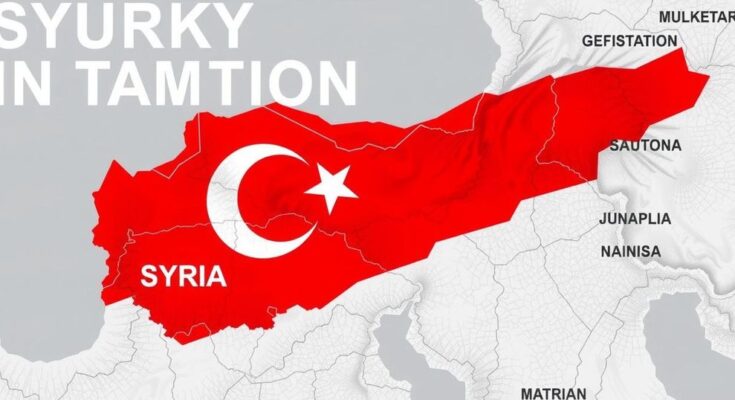The article evaluates the narrative asserting Turkey’s victory in Syria amidst the fallout from Bashar al-Assad’s regime. It argues that while Turkey has certain advantages, particularly due to its relationships with HTS and the Syrian National Army, numerous hurdles remain. These challenges include diminished Turkish influence, external diplomatic efforts by other nations, and ongoing tensions with Kurdish forces, suggesting a complex political refrain rather than an outright victory.
The narrative that Turkey has emerged victorious in Syria following the downfall of Bashar al-Assad is overly simplistic and presently unfounded. Although Turkey finds itself in a strategically advantageous position, primarily due to its alliances with the Hayat Tahrir al-Sham (HTS) and the Syrian National Army, it has yet to secure any definitive gains. President Recep Tayyip Erdoğan faces significant challenges in establishing Turkey as a power broker in post-Assad Syria.
The assumption that Turkey’s involvement has guaranteed its supremacy in Syria largely hinges on the efficacy of HTS and affiliated militias in orchestrating offensives against the Assad regime. While Turkey’s support was instrumental in facilitating these developments, its declared ambitions for post-war reconstruction and influence are still subject to external factors. Enhancements in infrastructure and investment opportunities will favor Ankara’s well-connected firms, yet Turkey’s overall leverage remains ambiguous.
Erdoğan’s outreach to HTS and post-Assad leaders has yielded a slow but steady inflow of international diplomatic engagement, including representatives from major global powers and neighboring Arab states. This represents a notable shift in regional dynamics, illustrating that HTS possesses options that diminish Turkey’s former intrusion into Syrian politics. Furthermore, Turkey’s claims of cultural affinity with Arab nations have proven to be tenuous, emphasizing the likelihood of other nations potentially outmaneuvering Turkey.
Compounding Turkey’s challenges is the complicated issue of Kurdish nationalism and the presence of the YPG, a key player supported by international allies. The precarious balance of power might allow Turkey a fleeting opportunity to act against Kurdish forces, but the prospects of sustained success are grim, particularly in light of the ongoing capability and resistance from Kurdish factions. Thus, any notion of Turkish dominance in Syria must be tempered by acknowledgement of the limitations and risks inherent in the situation.
In summary, celebrating a Turkish victory in Syria without recognizing the intricate geopolitical realities and enduring challenges can lead to miscalculations. Turkey’s strategic assets are counterbalanced by various liabilities, which may impede its influence in the evolving landscape of Syrian politics.
The article discusses the current situation in Syria following the fall of Bashar al-Assad, particularly focusing on Turkey’s role in the aftermath. After years of military involvement, Turkey has garnered some influence through its alliances with militant groups. However, despite claims of victory, the ahistorical and geopolitical complexities suggest that Turkey has yet to solidify its position and must navigate considerable obstacles in its engagement with different factions and powers in the region.
Ultimately, while Turkey has positioned itself in a seemingly favorable spot following Assad’s downfall, it is premature to declare any form of victory. The landscape is still shifting, and Turkey’s influence is not guaranteed. The complexities presented by other regional powers and internal divisions within Syria suggest that the situation requires continued observation and careful diplomatic maneuvering.
Original Source: foreignpolicy.com




